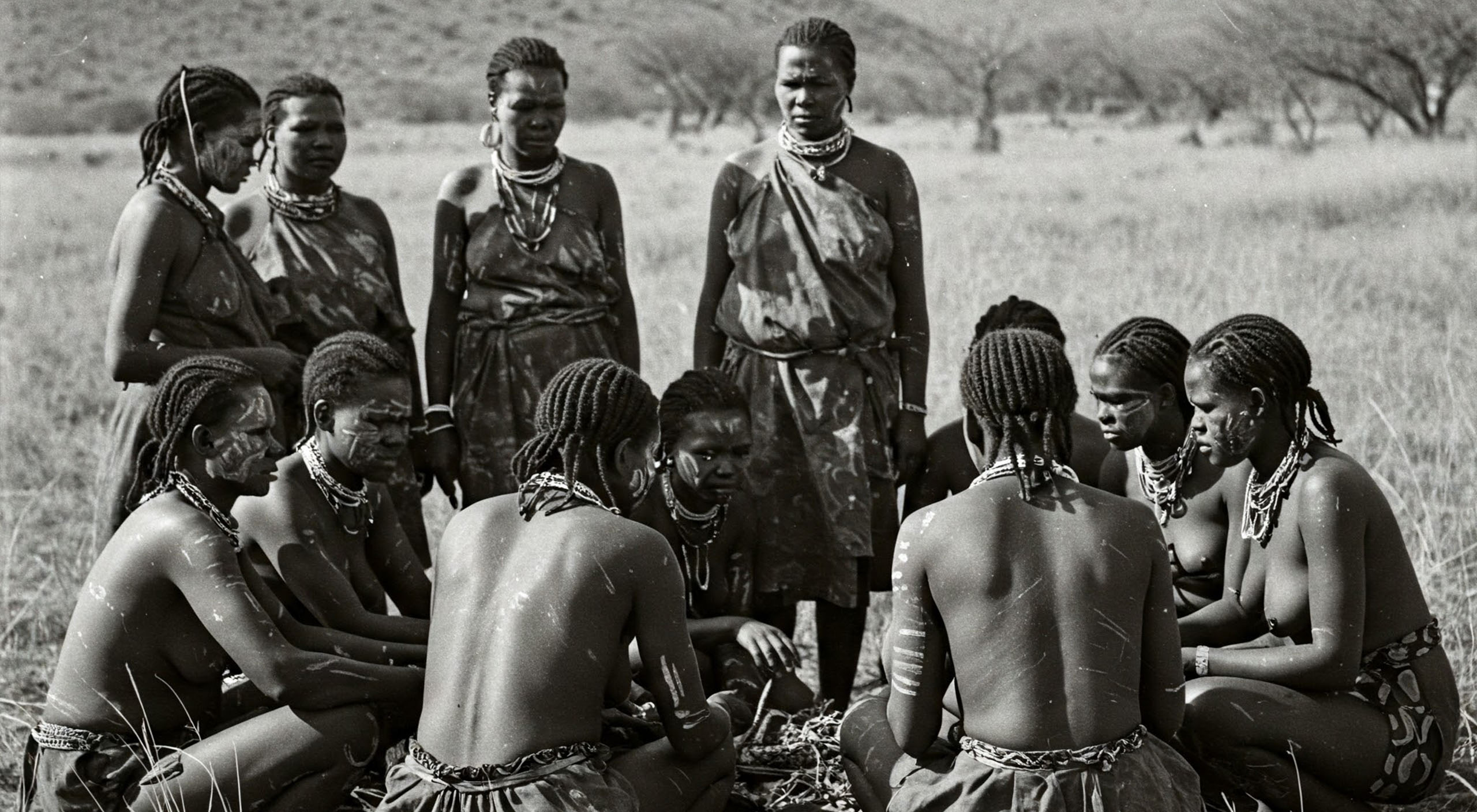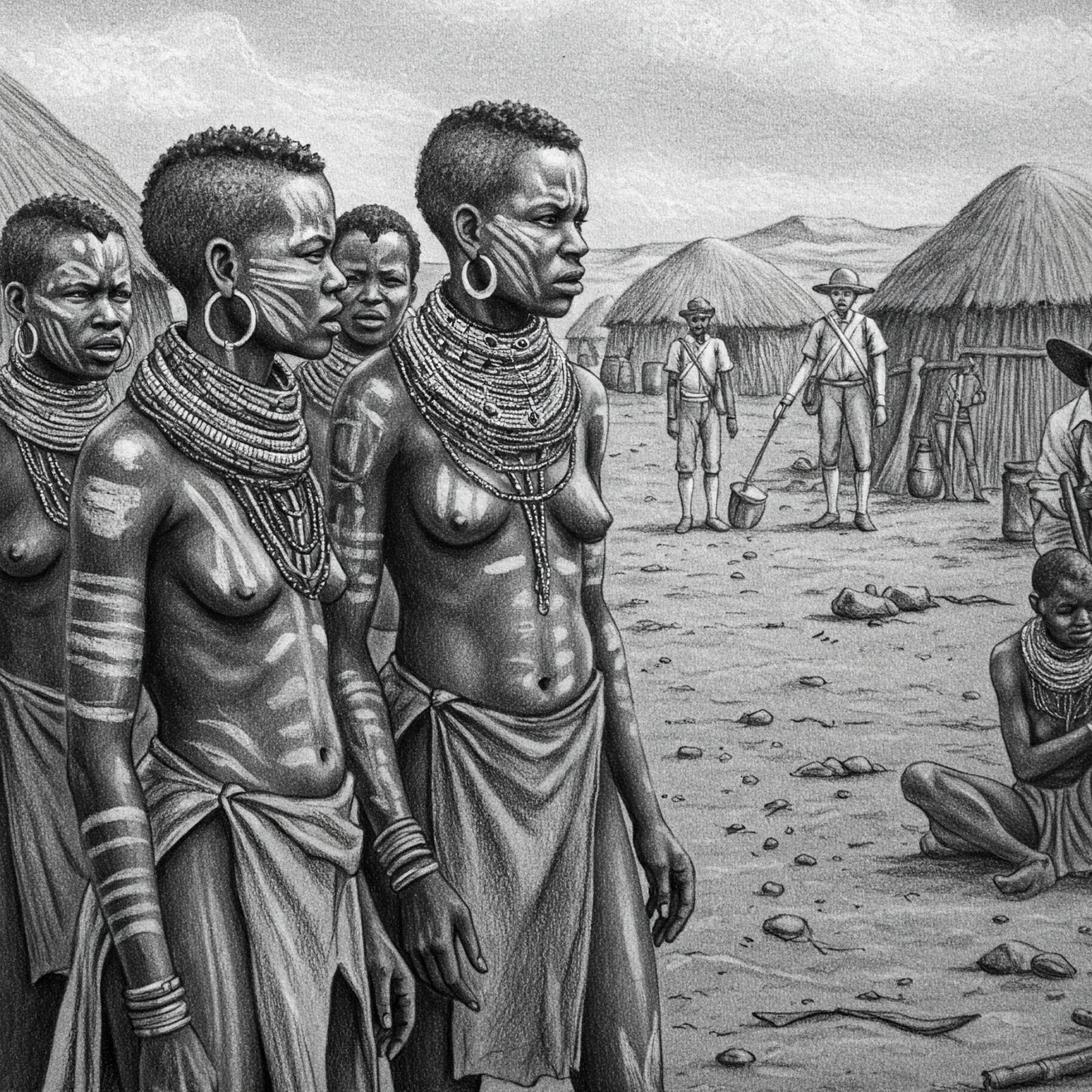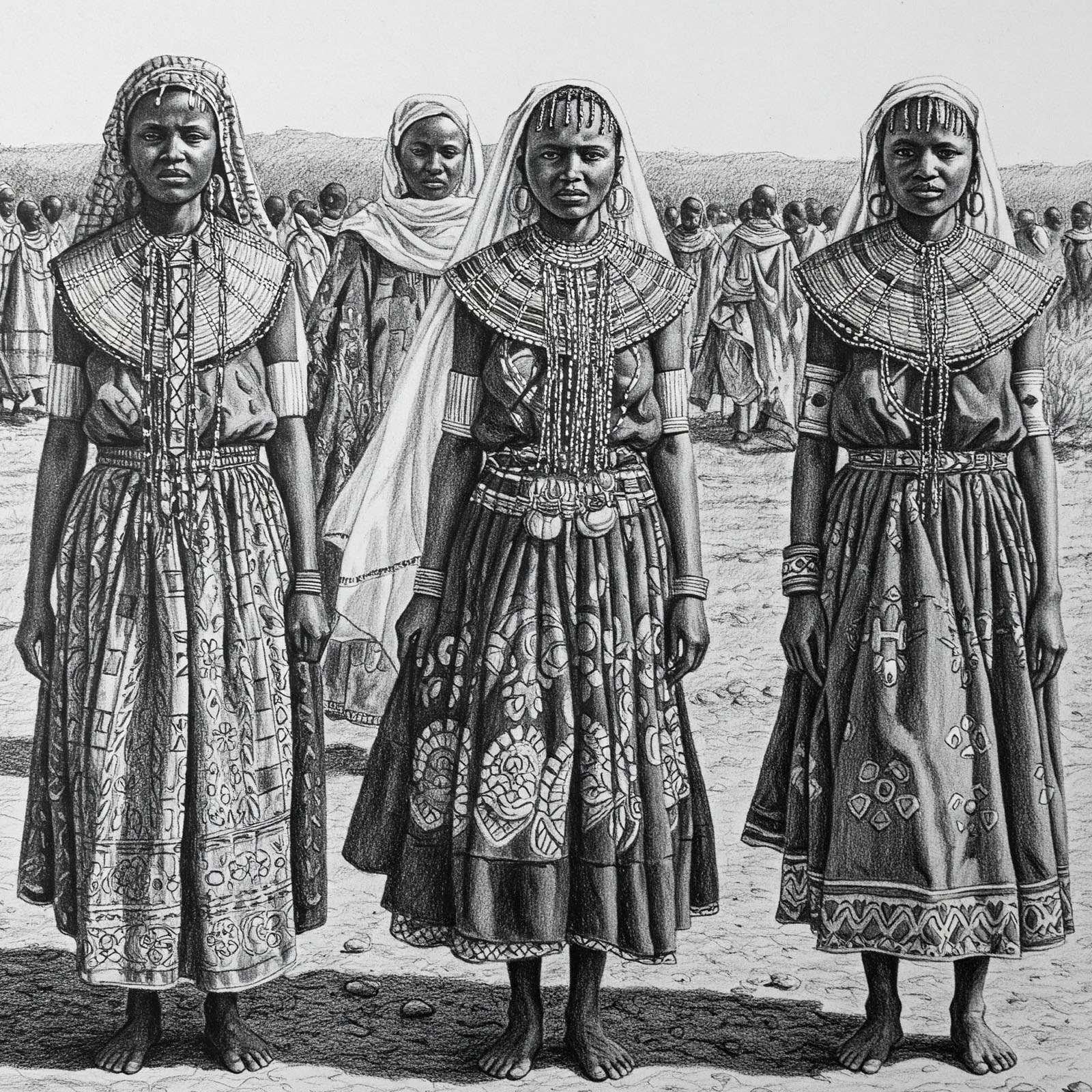
Khoisan Women Gather in Nature to Prepare for Ceremony
Khoisan women gather in harmony in a serene field, ready to begin a traditional ceremonial practice.
A Hidden Heritage
Labia Stretching: Preserving a Fading African Tradition in the Face of Cultural Erosion
In many remote regions of Africa, before the encroachment of foreign ideologies and modern globalization, life thrived in beautifully simplistic ways. People lived in harmony with nature, their bodies, and their communities. Practices that may appear unconventional to outsiders were not only accepted but celebrated—woven into the fabric of everyday life. Among these practices is labia stretching, a form of body modification traditionally passed down through generations of women.
What might appear strange through a Western lens is, in fact, a deeply meaningful tradition among several African ethnic groups. Labia stretching is a practice involving the elongation of the inner labia, often beginning during puberty. It is usually taught by older female relatives, such as aunts or grandmothers, and is considered a rite of passage into womanhood in many communities. This practice is not performed for aesthetic or sexual reasons alone—it is imbued with cultural identity, womanhood, community values, and pride.
But as Africa becomes increasingly interconnected with the outside world, especially through Western and Eastern ideological influence, traditions such as labia stretching are fading into obscurity.
The Simplicity and Freedom of Traditional Life
Before widespread external interference, communities in Africa experienced a lifestyle that, while simple, offered a profound sense of freedom, joy, and connection. Women and girls could engage in practices like labia stretching openly, without shame. Nudity in many of these societies was not taboo; rather, the body was seen as natural, respected, and free of the harsh moral judgments often associated with it in foreign religions and ideologies.
There was no inherent shame in the female form, and many communities embraced body modification, nudity, or body markings as cultural expressions rather than as subjects of scorn. This acceptance fostered a collective confidence and harmony with one's body, something that is starkly absent in societies driven by shame-based teachings and heavy regulation of female behavior.
Labia stretching, in this context, wasn't a medical procedure nor a cosmetic enhancement. It was a symbol of womanhood, maturity, and cultural pride, offering women a sense of identity and purpose within their society.
The Cultural Decline and Western Stigmatization
However, the contact between African societies and Western civilization has led to a deep erosion of this cultural acceptance. Colonial influence introduced not only foreign laws and economies but also Western moral frameworks—many of which clashed with local customs. Practices like labia stretching began to be viewed through lenses of stigma, shame, and misunderstanding.
The practice has increasingly been labeled as "primitive" or "bizarre" by those outside the culture, despite its deeply rooted meaning. This external moral policing has made it difficult for younger generations to carry on such traditions with pride. Even more damaging is the association of any indigenous body modification with misogyny or abuse, despite many African women regarding these rituals as empowering and communal.
Furthermore, the Western preoccupation with genital uniformity and medicalized "normalcy" often leads to pathologizing natural variations in women’s anatomy, casting further doubt and shame on traditional practices like labia stretching.
The Rise of Religious Conservatism and Cultural Suppression
Today, the threats to traditional African practices are not only from the West but also from Eastern and Middle Eastern ideologies, particularly through the spread of conservative Islamic doctrines in sub-Saharan Africa.
The imposition of modesty culture—often spearheaded by male-led religious conversions—has further suppressed women's bodily autonomy. In regions where Islamic extremism or conservatism gains ground, women are increasingly forced to cover their bodies, reject traditional attire, and abandon ancestral practices. The cultural openness once celebrated in many African societies is being replaced with rigid ideologies that demand uniformity, obedience, and invisibility from women.
These religious movements often disregard the richness of local customs, including practices like labia stretching, branding them as sinful, impure, or un-Islamic. As a result, communities are divided, younger generations become alienated from their roots, and elders are silenced or shamed for preserving indigenous knowledge.
The New Wave of Colonization
What began with European colonization centuries ago is now being mirrored by neo-colonial influences from Asia and the Middle East. This modern wave of colonization is not through conquest, but through economic leverage, religious influence, and cultural imperialism. The impact is just as devastating—erasure of identity, loss of self-determination, and destruction of cultural memory.
Africa's vast tapestry of traditions, including labia stretching, is under siege. What once belonged to communities as part of their rich oral history and everyday life now risks becoming mere footnotes in anthropology books. If not preserved, these traditions will vanish without the world ever understanding their beauty, depth, and purpose.
A Call to Remember and Respect
It is vital to approach traditions like labia stretching not with quick judgment but with curiosity, respect, and cultural humility. For many African women, this practice was (and for some, still is) a source of empowerment, bonding, and pride—not shame.
The preservation of such practices isn't just about maintaining rituals—it's about safeguarding autonomy, heritage, and identity. To reduce labia stretching to an outdated curiosity is to misunderstand the intricate tapestry of African womanhood.
The world must move toward a more inclusive understanding of cultural diversity, where communities are allowed to celebrate their practices openly and without shame. Efforts should focus on documenting, preserving, and educating rather than erasing. The goal should not be to judge what we do not understand, but to learn what it means for those who live it.
Honoring the Simplicity of a Culture Without Shame
Sometimes, simpler lives offer richer truths—freedom not burdened by overanalysis, joy not dictated by doctrines, and beauty that isn’t commercialized. Traditional African practices like labia stretching represent more than anatomy—they reflect a worldview of acceptance, community, and femininity.
If the world is to move forward ethically, we must listen more closely to the voices of indigenous women, respect the traditions they hold dear, and resist the impulse to whitewash, shame, or convert every culture into a global sameness.
Because in that sameness, something deeply human is lost.
"When tradition is silenced, identity fades. To preserve culture is to honor the soul of a people."

Khoisan Women Witnessing the First Contact with European Explorers
An illustrated depiction of four Khoisan women standing barefoot on dry earth, adorned in traditional attire, observing the bewildering sight of European explorers arriving in their remote African village. The women's expressions are a mixture of caution and curiosity, highlighting the moment of cultural collision and foreshadowing the deep changes colonialism would bring.

The Modern Erasure: Asian and Middle Eastern Neo-Colonial Influence on African Women's Culture
An evocative image showing African women clothed in conservative, non-traditional attire reflective of Asian and Middle Eastern religious and cultural influence. Their somber faces hint at the internal struggle of lost identity and tradition. In the background, faint outlines of older cultural symbols fade into obscurity, symbolizing the slow erasure of indigenous practices under the weight of neo-colonial imposition.




